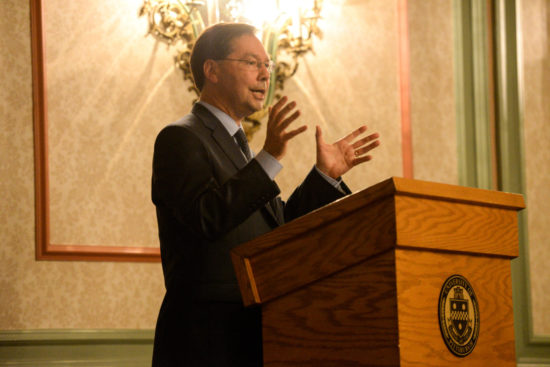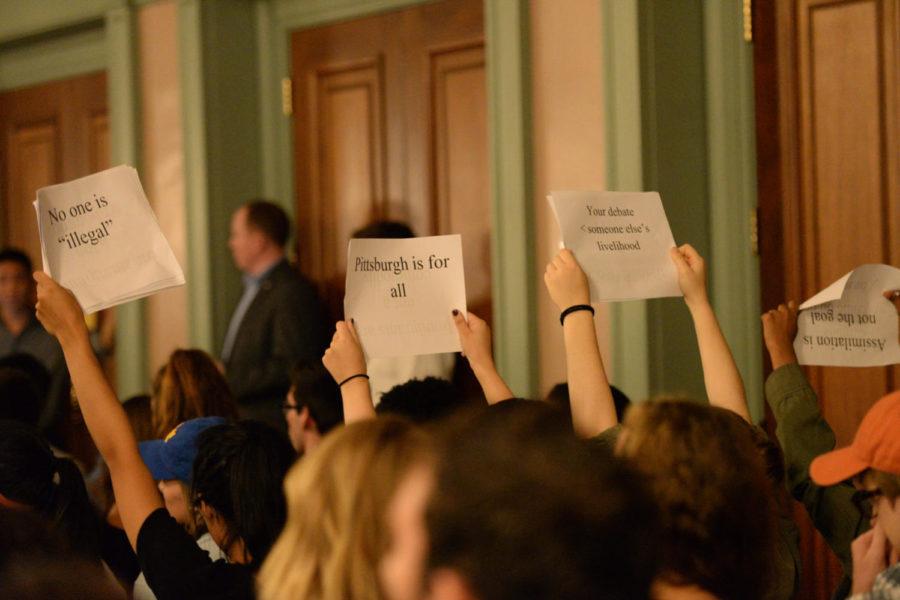Protesters held signs, made disruptive noises and yelled the names of people who lost their lives crossing the U.S.-Mexico border at the Cato vs. Heritage debate Wednesday evening.
After some protesters left the debate and the Pitt police escorted others out, the Kurtzman room was no longer filled to capacity. The College Republicans, Students for Liberty and Young Americans for Liberty hosted the debate, which tackled immigration policy and its effects on the United States.
Speakers included Alex Nowrasteh from the Cato Institute — a libertarian think tank headquartered in Washington D.C. — and Hans von Spakovsky from the Heritage Foundation — a D.C.-based conservative think tank.
The speakers differed in both political ideology and their argumentative structure. Von Spakovsky used a rhetorical-based argument, while Nowrasteh from Cato used largely empirical data — and the audience noticed.
“I am in favor of liberalized immigration because it’s good for Americans and it is good for the United States,” Nowrasteh said. “And in order to prove that, I need to rely on the facts of the matter. If the facts were different, I’d have a different opinion on immigration.”
Jeremy Reiff, vice president of Students for Liberty at Pitt, said this style caught him by surprise.
“Usually as a libertarian we like more philosophical arguments, but Alex came out with some of the most damning evidence … by showing the numbers,” Reiff said.

(Photo by Anna Bongardino | Assistant Visual Editor)
Nowrasteh came out immediately as anti-President Donald Trump. He said Trump’s policies are ineffective and an illegitimate expansion of the federal government. He slammed the cost and ineffectiveness of the border wall, along with other cost benefit analyses of several Trump administration immigration policies.
To defend immigrants in the nation in light of Trump’s recent battle with Deferred Action for Childhood Arrivals, Nowrasteh cited studies stating immigrants commit crimes at lower rates than American citizens. He also said immigrants are usually not a financial drain on the country because they do not benefit from social services for their first five years in the country.
Von Spakovsky came back at Nowrasteh, arguing that any crime committed by an undocumented immigrant is too much. Von Spakovsky tried to spar with Nowrasteh’s data analysis, pointing out that the policies on sanctuary cities allow undocumented immigrants to get off scot-free after committing a crime because they don’t need to be turned over to the federal government. He included the case of Kathryn Steinle, a young woman shot in San Francisco by an undocumented immigrant.
“[Kathryn Steinle] would be alive today if it weren’t for the sanctuary policy of San Francisco,” he said.
Casey Madden, a first-year graduate student in the school of public health and a self-identified anarchist, was among those who protested the debate.
“They aren’t arguing immigration, they are arguing how best to exploit, really, just people who are coming from South America […] This is absolutely an issue of race,” Madden said.
Although there was disagreement on the debate floor, both speakers, organizers and the moderator agreed on one thing — that disruptive protesters had no place at a debate. Marlo Safi, president of College Republicans at Pitt and the organizer of the debate, was glad the University was able to host an event promoting free speech.
“This is what academia is about,” Safi said.
Marlo Safi used to write for the opinions desk at The Pitt News.
Editor’s note: A previous version of this article stated Marlo Safi was “glad the University was able to host a conservative event.” This is not true. Safi said the event was an “event for civil discourse” and not a “conservative event.” A previous version of this article also left out the Young Americans for Liberty as one of the three organizers of this event. The Pitt News regrets these errors.



